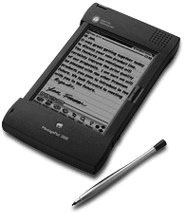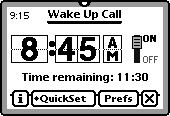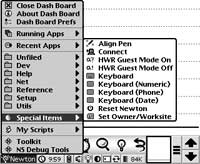
Five Speed Software, Inc. was a privately held Nevada corporation serving clients in the US, Europe, and Japan. The company also sold and supported several consumer software products, sold in over 70 countries worldwide.
Five Speed got its start doing research, consulting and contract development for non-traditional (in those days) networked computing environments, primarily automotive and handheld computer systems. Then in 1998, the first consumer-oriented product came out of the Five Speed laboratories: Wake Up Call, a personal alarm clock application built to showcase the technological capabilities of the newest generation StrongARM-powered Newton devices from Apple Computer, Inc.
The Newton was Apple's foray into the "PDA market" (as it was then called), and it was especially interesting because it was well ahead of its time—offering cutting-edge (and indeed, sometimes "bleeding-edge") technological features in a small form factor that at that time were years ahead of anything else on the market. In short, it provided a peek into the future.
Five Speed's consumer software debut was met with accolades and unexpected levels of enthusiasm—in what was essentially a niche market—and the company followed up later in 1998 with a major software release for the Newton. Its Dash Board software package enhanced the core interface of the Newton, adding a hierarchical menu system, a scripting system, and a high-speed application launcher that exploited the stylus-based input system of these machines.

More than a proof-of-concept, Dash Board immediately became an extremely popular enhancement to the Newton systems it supported. Although Apple's high-concept, high-priced Newton product line was eventually discontinued, its cult status has contributed to the ongoing existence of a lively user base. Five Speed continued to sell and support its Newton products for many years, and the Newton community is very much alive, even today.
As handheld computing evolved from the PDA concept to the smart-phone concept, the industry remained at the core of the company's work for private clients. Like the Newton in the 1990s, NTT Docomo's i-mode and similar systems originating in the Japanese market provided an advance look at technologies that would become commonplace throughout the world. Smart phones and wireless data systems remain a key area of focus for the company.
In 2004, the company collaborated on the development of iGet, the innovative Mac file transfer tool. iGet was subsequently acquired by Nakahara Informatics, Inc. in 2007.
Today, Five Speed Software, Inc. the company no longer exists, but this website has been mostly preserved for historical interest. The Five Speed Software name lives on as a software publishing imprint of MASONMARK.COM

